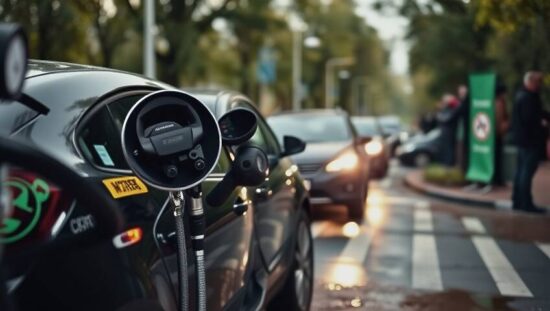Greenpeace demands a licensing fee on new combustion engine vehicles. Revenue from the tax could finance a new purchase incentive for electric vehicles.
New calculations, based on the 2023 registration numbers, show a real revenue of about eight billion euros from the licensing fee, according to Greenpeace. The sum would be enough to finance a purchase incentive of 4,500 euros for around 1.8 million electric vehicles, the calculation states, as reported by the Funke Media Group’s Monday editions.
“In many other EU countries, such as Sweden, the Netherlands, or Denmark, there is already such a tax” said Greenpeace mobility expert Marion Tiemann to the Funke newspapers. “Who buys a new combustion engine in countries like Sweden, the Netherlands, or Denmark, will be taxed relatively little on frugal new cars, but strongly on particularly climate-damaging fuel guzzlers” she added.
“If someone in the middle of the climate crisis still wants to buy a new combustion engine SUV with a few hundred horsepower, they should pay a lot more for it” Tiemann said further. “With these revenues, the next federal government could fully finance the promotion of small electric vehicles and thus accelerate the transition from combustion engines to electric vehicles.”
After the purchase incentive was discontinued, the registration numbers for electric vehicles plummeted last year. The exact numbers will be published by the Federal Motor Transport Authority on Monday, but it is already clear that the old mark of 524,219 electric vehicles in 2023 will be significantly missed.
Greenpeace expects that the steering effect of the tax would also benefit VW, BMW, and Mercedes in reaching the European fleet targets and could then also contribute to avoiding penalty payments. The amount someone would have to pay for a new combustion engine would depend on the car, with particularly climate-damaging vehicles being strongly taxed, according to Greenpeace.
Experiences from other countries show the success of such a tax in reducing CO2 emissions. In Denmark, the Netherlands, and Sweden, a significantly faster decline in the average CO2 value of new registrations can be observed, compared to Germany. Denmark and the Netherlands have been using such a licensing fee for more than 15 years, while Sweden has been using it since 2018. However, the system was allowed to expire in Sweden at the end of 2022.
The Association of the Automotive Industry (VDA) rejects such a bonus-malus regulation. “A licensing fee is neither environmentally policy-oriented nor does it contribute to strengthening social acceptance of climate-neutral mobility” said a spokesperson to the Funke Media Group’s newspapers. Instead, it would burden consumers. Ultimately, such a tax would also disadvantage car owners who, due to financial reasons or the lack of a sufficient charging infrastructure, cannot yet consider the purchase of an electric vehicle, the spokesperson said further.
Due to budget difficulties, the electric vehicle purchase incentive in Germany had expired at the end of 2023. Chancellor Olaf Scholz (SPD) has recently advocated for a European purchase incentive for electric vehicles.





